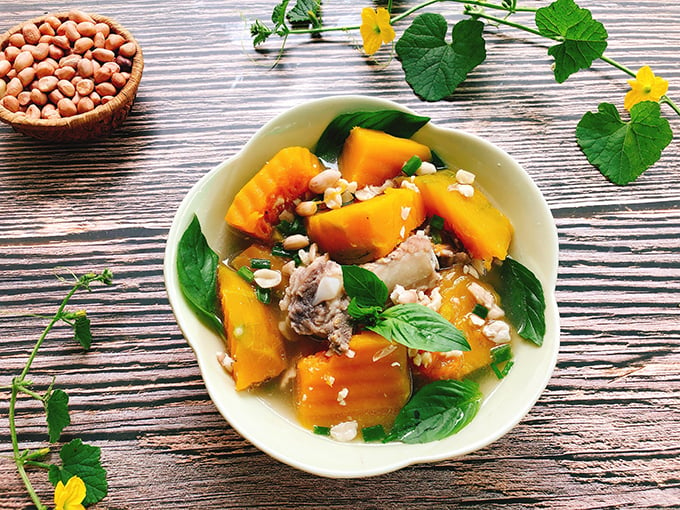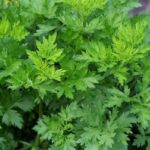Pumpkin, also known as squash, is a popular fruit from the gourd family in Vietnam, with three main varieties: round, gourd-shaped, and honeydew pumpkin. Beyond its delicious taste, pumpkin boasts an impressive nutritional profile, offering a plethora of health benefits.
A 254g serving of cooked pumpkin provides: Vitamin A (245%), Vitamin C (19%), Vitamin B2 (11%), Vitamin E (10%), 49 calories, 0.2g fat, 2g protein, 12g carbohydrates, 3g fiber, 16% potassium, 11% copper, 11% manganese, 8% iron, and 94% water. Additionally, pumpkin is a good source of B vitamins, magnesium, zinc, phosphorus, and folate.
According to Dr. Truong Quang Hai from Hanoi Medical University, pumpkin is a beloved food not only for its delicious taste and ease of preparation but also for its abundant nutritional value. Notably, its high vitamin A content surpasses that of other vegetables and plays a crucial role in supporting the treatment of various ailments.

Pumpkin Leads the Pack in Vitamin A Content Among Vegetables
Recent studies underscore the essential role of vitamin A in fortifying the intestinal mucosa, thereby enhancing infection resistance. In addition to vitamin A, pumpkin delivers a host of other micronutrients, including vitamins C, E, iron, and folate, which collectively bolster the immune system.
Research indicates that vitamin A not only boosts immunity but also fortifies the body’s defense against infections. Conversely, vitamin A deficiency is associated with a weakened immune system. Pumpkin is also rich in vitamin C, which stimulates the production of white blood cells, supporting immune cell function and expediting wound healing.
Vitamin A in pumpkin helps safeguard eyesight, especially against age-related vision decline. Additionally, pumpkin is abundant in vitamin E and beta-carotene. Vitamin E, a potent antioxidant, shields the body from free radicals and the harmful effects of peroxides. Beta-carotene, a type of carotenoid, converts into vitamin A in the body, contributing to eye health and preventing vision-related ailments.
In traditional medicine, according to herbalist Nguyen Huu Toan from the Hai Phong Oriental Medicine Association, pumpkin is revered as a precious herb with sweet and warm properties. It is used to clear heat, quench thirst, and generate body fluids. Pumpkin is often employed to alleviate ailments such as headaches, dizziness, vision problems, hepatitis, and kidney weakness. Consuming pumpkin cooked with peanuts and lotus seeds can provide relief from headaches and dizziness.

In Traditional Medicine, Pumpkin is Valued for Its Sweet and Warming Qualities
While pumpkin offers a plethora of health benefits, healthcare experts caution against the following common mistakes:
Excessive Pumpkin Consumption
Nutritionists advise against eating pumpkin more than twice a week. Due to its high content of provitamin A, overconsumption may overwhelm the body’s ability to digest it, leading to accumulation in the liver and under the skin. This can result in a condition known as carotenemia, characterized by yellow discoloration of the skin, particularly noticeable on the nose, palms, and soles.
Aging Pumpkin Undergoes Fermentation
Pumpkin, being naturally high in sugar, can undergo anaerobic respiration if stored for extended periods. This leads to fermentation and qualitative changes. Consuming aged or fermented pumpkin poses potential health risks.

Avoid During Digestive Disorders
Individuals experiencing digestive issues should refrain from consuming excessive pumpkin due to its high fiber content, which can exacerbate discomfort and negatively affect the condition.
Refrain From Refrigerating Cooked Pumpkin
Storing cooked pumpkin in the refrigerator, especially in the freezer, is not recommended. Pumpkin tends to turn brownish-yellow when chilled, indicating potential health risks.
Limit Cooking Pumpkin with Oil
Using oil when cooking pumpkin may diminish its nutritional value. Opt for alternative cooking methods such as boiling, baking, or steaming to maximize the retention of nutrients.
Maintain healthy eating habits and make the most of the wonderful benefits that pumpkin has to offer!





































